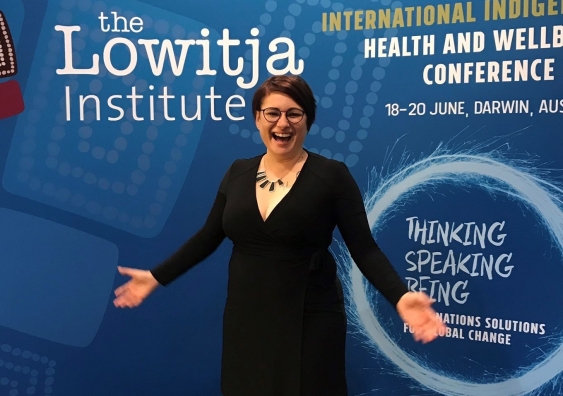Big data researcher wins Emerging Aboriginal and Torres Strait Islander Researcher Award
UNSW medical data researcher Dr Kalinda Griffiths has won a major award from the Lowitja Institute for her research into health inequalities across Australia.
UNSW medical data researcher Dr Kalinda Griffiths has won a major award from the Lowitja Institute for her research into health inequalities across Australia.

Lucy Carroll
UNSW External Communications
9385 8732, 0402 005 319
l.carroll@unsw.edu.au
UNSW Sydney researcher Dr Kalinda Griffiths has won the 2019 Lowitja Institute’s Emerging Aboriginal and Torres Strait Islander Researcher Award for her research into the use of big data to address major health inequalities in populations across Australia.
The award, presented at the Lowitja Institute International Indigenous Health and Wellbeing Conference in Darwin, recognises an emerging Aboriginal and Torres Strait Islander researcher who is nationally recognised and has made a significant contribution to their academic field.
Dr Griffiths’s research focuses on Indigenous data governance, cancer epidemiology and health disparities, with emphasis on improving cancer support services and facilities to Aboriginal and Torres Strait Islander communities.
“This award recognises the power of data to shift the way we screen, diagnose and treat cancer in remote communities,” says Dr Griffiths, a Scientia Fellow at the Centre for Big Data Research at UNSW Medicine. “Despite some improvements in access to cancer screening we are not seeing dramatically improved outcomes. Remoteness still plays a big role; the issue is people are being diagnosed at later stages relative to other populations.”
Dr Griffiths said early diagnosis and establishing specialist on-country cancer centres were essential for improving cancer outcomes community wide and minimising the number of patients travelling to Darwin for treatment.
“This will help people patients be more comfortable and have confidence to navigate more culturally sensitive services. People have roles and responsibilities in the community and travelling to access services can take that away.”
As a Yawuru woman who was born in Darwin, Dr Griffiths witnessed illness and disease in her community and was driven to specialise in big data and Indigenous populations to tackle health issues at a broad community level.
After laboratory traineeship in microbiology sparked her interest in medicine, and she went on to complete an undergraduate degree in biomedical science and a Master of Public Health. In 2011, Dr Griffiths was named Northern Territory Young Australian of the Year and in December she was named one of Australia's Superstars of STEM for 2019 by Science & Technology Australia.
“I was motivated by improving the life expectancy of my children and their generation. To extend my knowledge beyond basic science to the population level is so important to help close the health gap and address disease and preventable illness in remote communities,” says Dr Griffiths.